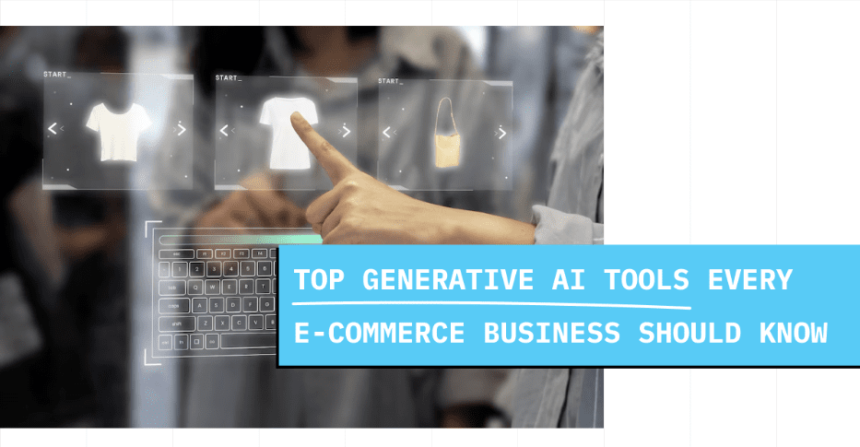You won’t believe the buzz Generative AI is creating in e-commerce! Imagine crafting personalized content and tailoring experiences, all thanks to this cutting-edge technology. To ace it, you need to arm yourself with neural network frameworks and top-of-the-line natural language processing libraries.
When you partner with a top-tier Generative AI Development Company, you’re not just adopting a trend; you’re embracing a paradigm shift in how businesses engage with their customers online. This innovative approach streamlines operations, enhances customer satisfaction, and ultimately drives sales to unprecedented levels.
It’s not merely a game-changer; it’s a revolution in online shopping, setting the stage for the future of e-commerce.
What is Generative AI in E-Commerce Platforms?
Generative AI is making waves in e-commerce platforms. This fascinating technology taps into patterns and data to generate new content, designs, and solutions. Just think about the potential to revolutionize online shopping! With Generative AI, you get personalized product recommendations, unique product descriptions, and even customized interfaces.
And that’s not all – it’s capable of crafting visuals like images and videos that perfectly match individual preferences. It’s almost like having your own personal shopping assistant driven by AI, ensuring every interaction feels uniquely tailored to you.
How can AI be used in E-commerce?
Artificial intelligence (AI) has become increasingly integral to the e-commerce industry, offering innovative solutions to enhance customer experiences, streamline operations, and drive sales. Some of the key applications of AI in e-commerce include:
- Personalized Product Recommendations: AI algorithms analyze customer data and browsing behavior to deliver tailored product recommendations, increasing the likelihood of conversion and fostering customer loyalty.
- Predictive Analytics: AI-powered predictive analytics help e-commerce businesses forecast customer demand, optimize inventory management, and anticipate market trends, enabling more informed decision-making and strategic planning.
- Chatbots and Virtual Assistants: AI-driven chatbots and virtual assistants provide instant customer support, answer queries, and assist users throughout the purchasing process, improving overall customer satisfaction and retention.
- Visual Search Technology: AI-powered visual search allows customers to search for products using images rather than text, enhancing the search experience and facilitating product discovery.
- Fraud Detection and Prevention: AI algorithms analyze transaction data in real-time to identify suspicious activities and prevent fraudulent transactions, safeguarding e-commerce platforms and protecting both businesses and customers from cyber threats.
Generative AI is revolutionizing the e-commerce landscape by automating tasks, personalizing experiences, and creating high-quality content. Here are some of the top generative AI tools for e-commerce businesses in 2024
- OpenAI’s GPT-3: GPT-3 is one of the most advanced language generation models, capable of producing human-like text based on input prompts. E-commerce businesses can utilize GPT-3 for generating product descriptions, writing marketing copy, and creating personalized communication with customers.
- Recombee: Recombee offers AI-powered recommendation systems designed specifically for e-commerce platforms. It analyzes user behavior and product data to deliver accurate and personalized recommendations, thereby increasing engagement and sales conversion rates.
- Vue.ai: Vue.ai leverages computer vision and AI technologies to provide visual search, product tagging, and personalized styling recommendations for e-commerce retailers. Its solutions help enhance product discovery and improve the overall shopping experience.
- Pixlee: Pixlee offers AI-powered user-generated content (UGC) solutions for e-commerce businesses. It automatically identifies and curates user-generated photos and videos related to products, enabling brands to showcase authentic content and drive customer engagement.
- Curata: Curata provides AI-driven content curation and creation tools for e-commerce marketers. It helps businesses discover relevant content, generate product descriptions, and create compelling marketing materials, thereby saving time and resources while maintaining quality.
- Clarifai: Clarifai offers visual recognition and image analysis APIs that e-commerce companies can utilize for tasks such as product categorization, content moderation, and visual search. Its AI models are trained to recognize and understand various objects, scenes, and concepts within images.
- Dynamic Yield: Dynamic Yield offers AI-powered personalization solutions for e-commerce websites, enabling businesses to deliver individualized experiences across multiple channels. It uses machine learning algorithms to optimize product recommendations, email campaigns, and website content based on user behavior and preferences.
Implementation Tips for Generative AI in E-commerce
Implementing generative AI in e-commerce can offer several advantages, from personalized product recommendations to generating product descriptions or even designing new items. Here are some implementation tips:
- Understand Your Data: Before implementing Generative AI tools, ensure that you have a thorough understanding of your e-commerce data, including customer preferences, purchase history, and product attributes. This will help you effectively train AI models and generate relevant insights.
- Start Small and Iterate: Begin by experimenting with small-scale implementations of Generative AI tools and gradually expand their usage based on feedback and performance metrics. Continuously iterate and refine your AI-driven strategies to maximize their effectiveness.
- Focus on User Experience: Prioritize user experience throughout the implementation process, ensuring that AI-generated content and recommendations enhance rather than detract from the overall shopping experience. Test different approaches and solicit feedback from customers to optimize AI-driven interactions.
- Monitor Performance Metrics: Regularly monitor key performance indicators (KPIs) such as conversion rates, average order value, and customer satisfaction scores to assess the impact of Generative AI on your e-commerce business. Adjust your strategies as needed to achieve your desired outcomes.
Conclusion
Generative AI, the ultimate secret weapon for e-commerce, is poised to revolutionize online shopping as we know it. With its transformative potential, it’s like unlocking a whole new level of customer engagement and business efficiency.
Just imagine wielding these powerful tools to elevate customer experiences, drive up sales, and streamline operations effortlessly. It’s not just about staying relevant; it’s about leading the pack by crafting personalized, captivating shopping journeys that resonate with today’s savvy consumers.








